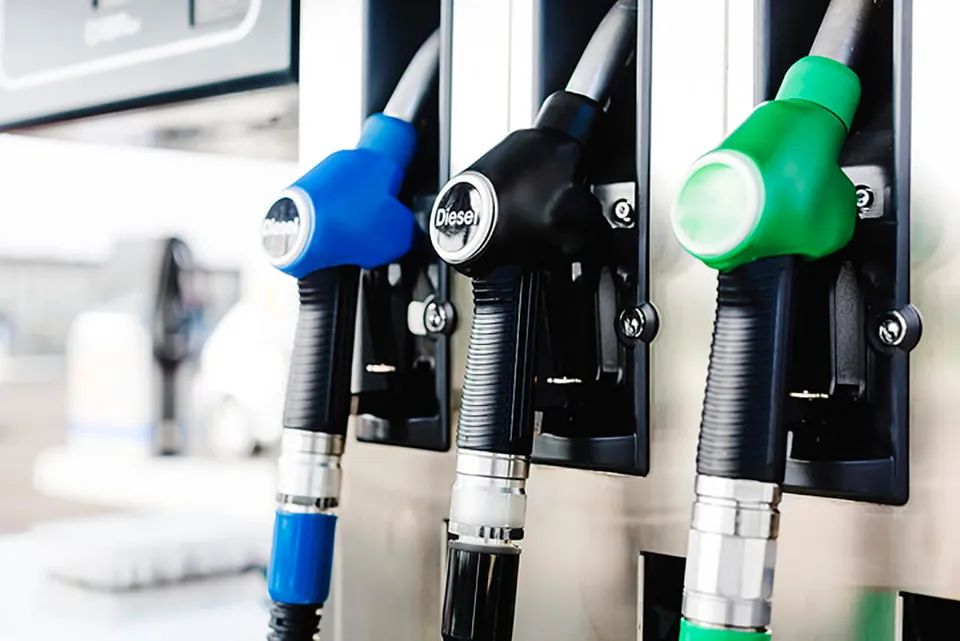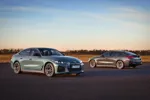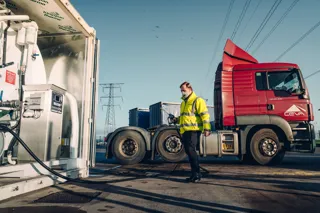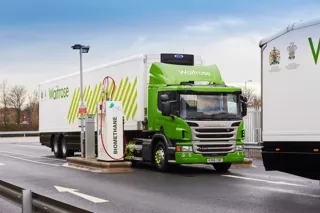The Government should ban the sale of new diesel-powered heavy goods vehicles (HGVs) by 2040.
The National Infrastructure Commission, which advises ministers, says the road freight sector needs “greater support and faster action” to decarbonise at the rate needed to meet the UK’s carbon emission goals.
The Government, it says in its annual report, needs to publish a cross-modal freight strategy this year, with a firm commitment to phase out diesel HGVs by 2040, along with detailed decarbonisation plans consulted on with the road haulage and logistics industry.
Ministers are promising the freight strategy will be published this year, while a consultation on ending the sale of diesel HGVs is also expected to be launched.
On the potential of a 2040 phaseout of diesel-powered HGVs, Volvo Trucks says its objective is to be fossil-free by 2040.
By 2030, it expects half of the trucks it sells in Europe to be electric. A spokesman said: “We believe the internal combustion engine (ICE) will also play an important role in 2040, provided it can run on energy from renewable sources, such as bio-LNG (liquid natural gas) and HVO (hydrotreated vegetable oil).”
At the same time, Volvo expects there will be “significant growth” in battery electric trucks for local and regional operations and, later this decade, for fuel cell electric trucks for longer and heavier jobs. Mercedes-Benz Trucks, meanwhile, aims to have all new vehicles in Europe, North America, and Japan ‘tank-to-wheel’ CO2-neutral by 2039.
“To achieve this, we’re focusing on battery power and hydrogen fuel cells,” explained a spokesman for Daimler Truck.
“(We want) a combination which enables us to offer customers the best vehicle options, dependent on application.
“Battery power is suited to lower cargo weights and shorter distances; fuel-cell power will be preferred for heavier loads and longer distances.”
The zero-emission roadmap for MAN Truck & Bus also includes the introduction of hydrogen-powered vehicles alongside fully electric models.
The manufacturer already offers series production of the MAN Lion’s City E and eTGE as well as the eTGM electric distribution truck. A new all-electric truck is expected to be launched in 2023.
Apart from the rapid development of battery technology, MAN says hydrogen is a good complementary option as an alternative fuel for long distance transport.
“There needs to be sufficient funding and infrastructure in place so operators can make the switch,” Phil Moon, Daf Trucks
ROAD TO ZERO
The Road to Zero strategy, published in July 2018, stated that the Government’s long-term goal was the development and deployment of zero-emission HGVs.
However, it acknowledged that the pathway to achieving this was not as clear as for new petrol/diesel cars and vans, which it will end the sale of from 2030.
A consultation will be launched later this year to decide the distance a new hybrid electric van or car can travel on zero emissions, to remain on sale from 2030 to 2035.
Logistics UK wants ministers to ensure there are practical alternatives to diesel HGVs before a phaseout of these vehicles is considered.
Alex Veitch, general manager for public policy at Logistics UK, said: “In order for the commercial sector to be able to deliver, Government should work with industry to develop a long-term pathway to decarbonisation, providing clarity on the technology and alternative fuels it supports so manufacturers and operators can invest with confidence.”
FLEET OPERATIONS
The John Lewis Partnership has chosen biomethane as a low-carbon alternative to diesel as it gears up to stop using fossil fuels across its entire 4,800-strong fleet by 2030.
In March 2019, the employee-owned business pledged to be net zero carbon across its entire operations by 2050 at the latest , and its 600 HGVs to be switched to low-carbon biomethane by 2028.
A new biomethane gas filling station at its Berkshire head office is helping the conversion of the Bracknell Waitrose fleet to biomethane, complementing gas filling stations already in use near John Lewis and Waitrose regional distribution centres in Leyland, Lancashire, and in Northampton.
Serving approximately 120 Waitrose heavy goods trucks, the vehicles will run on biomethane made from food waste and food processing waste materials rather than diesel.
John Lewis estimates this will reduce CO2 emissions by 80%, with each truck saving more than 100 tonnes of CO2 every year.
In terms of plug-in power, DHL Freight and Volvo Trucks have joined forces to launch the first pilot test of a fully-electric Volvo FH truck with a gross combination weight of up to 60 tonnes.
Starting in March, the truck will operate between two DHL Freight logistics terminals in Sweden, a distance of approximately 150km (93 miles).
During the trial, Volvo and DHL say they will gain important experience and information regarding the set-up and operation of an “adequate” charging infrastructure, helping to strike the right balance between operated distance, load weight and charging points in daily road freight operations.
ZERO-EMISSION TRUCKS
The Volvo FL Electric and Volvo FE Electric trucks are already in serial production, while DHL Supply Chain recently put a new Volvo FL Electric into operation in London – the first purpose-built fully electric Volvo truck for city distribution in the UK.
At the end of last year, Volvo Trucks in North America also started sales of the VNR Electric, and this year will mark the sales start in Europe of the heavy-duty electric product range.
Following successful trials with operators in Germany and the Netherlands, Daf Trucks has launched an electric CF offering range of up to 200km (124 miles).
Available to order now, production of the 6x2 rigid and 4x2 tractor variants started this month. Mercedes-Benz customers, including DPD, Hovis, Wincanton and Yodel, have been making use of the four-tonne payload of the 7.5-tonne Fuso eCanter since 2018. This year it will launch its first fully electric truck – the eActros – with a 200km (124-mile) range. It’ll be followed by the Mercedes-Benz eEconic, a battery-electric version of the low-entry Econic.
“The first customer tests of this truck are being planned, and we know municipal operators are excited about a truck with zero emissions and the maximum five-star rating under Transport for London’s Direct Vision Standard,” said a spokesman for the truck-maker. However, it recognises that it’s not only electric distribution and municipal trucks that are needed, which is why it announced the Mercedes-Benz eActros LongHaul.
“This battery-powered tractor unit should be ready for series production in 2024, with a range of 500km (310m) on a single charge, more than meeting the needs of nationwide hauliers,” the spokesman said.
“Looking further ahead, we have our fuel-cell concept – the Mercedes-Benz GenH2 Truck.”
The production truck will have an operational range of up to 1,000km (620m) on a single tank of liquid hydrogen when it comes to market in the second half of the decade.
In the meantime, Daimler Truck and Volvo have formed Cellcentric – a joint venture to accelerate the development of hydrogen fuel cells.
“We have also signed an agreement with Linde to jointly develop the next generation of liquid-hydrogen refuelling technology for fuel-cell powered trucks,” said a spokesman.
Daf Trucks already offers alternatives to fossil-fuels, including electric variants within its LF and CF model ranges.
Phil Moon, marketing manager at Daf Trucks, told Commercial Fleet: “Of course, the entire DAF Trucks range can be fuelled right now with HVO, which is renewable, produced from sustainable sources and can deliver a well-to-wheel carbon saving of up to 90% compared to fossil diesel.”
GOVERNMENT HELP
The CEOs of Europe’s commercial vehicle manufacturers, under the umbrella of the European Automobile Manufacturers’ Association (ACEA), joined forces with scientists from the Potsdam Institute for Climate Impact Research (PIK), to publish a road-map and conditions for transforming the road freight transport system at the end of 2020.
It is calling for a dense network of charging and refuelling infrastructure suitable for trucks for the operation of low- and zero-emission heavy trucks.
Henrik Henriksson, chair of ACEA’s commercial vehicle board and CEO of Scania, said: “If road freight transport is to maintain its role in serving society, we need to move away from fossil fuels as quickly as possible.
“We know it is possible and we are ready to make it happen. But we cannot do it alone; we need policymakers and other stakeholders to join forces with us.”
Moon says that this should include policy options such as road charges based on CO2 emissions, and an energy taxation system based on carbon and energy content.
He added: “A dense network of charging and refuelling infrastructure suitable for trucks is also crucial for the operation of low- and zero-emission heavy-duty vehicles.
According to ACEA and PIK, a sound CO2 emissions pricing system could be one of the most effective instruments, as zero-emission vehicles simply will not take off as long as diesel remains cheaper.
He concluded: “It is important that policy makers recognise that, for non-fossil based energy sources to compete, there needs to be sufficient funding and infrastructure in place so operators can make the switch.
“This is why we look forward to the publication of the Government’s Transport Decarbonisation Plan and hope it will give the sector a clear view of the road ahead.”
























Login to comment
Comments
No comments have been made yet.